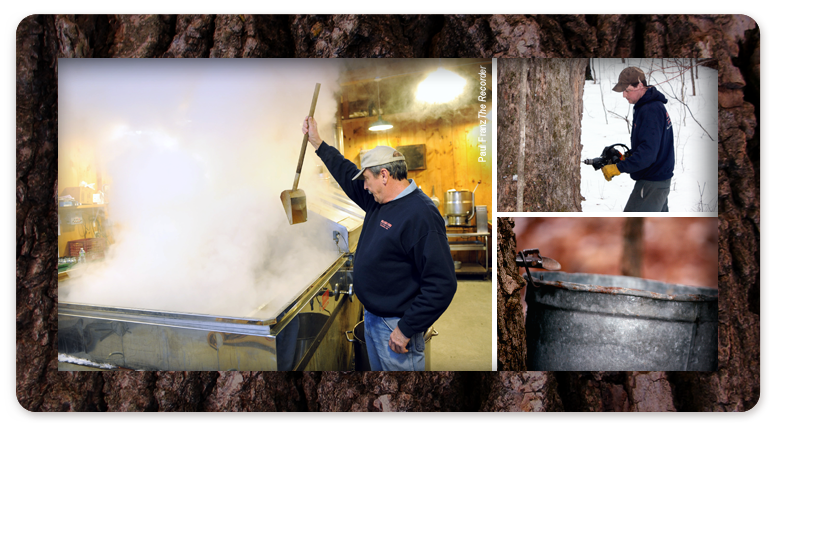
From Sap to Syrup
As days get warmer and winter loosens its icy grip, there are two things that New Englanders can count on: dirt roads turn to mud and sap buckets begin to appear along country roadsides. The start of sugaring season signals that winter will soon wind down and spring is on the way. We head to the woods to tap sugar maple trees beginning in late February, and the season continues through mid-April.
In order for sap to flow, the nights need to be below freezing (low 20s) followed by warm days (40-45° F). This freeze-thaw cycle is critical because as the temperature warms, the ice inside the trunk melts and the ice-compressed gases expand, forcing the sap out of the trunk.
When tapping a sugar maple, it"s best to drill a taphole that can provide an ample amount of sap while maintaining the long-term health and sap production of the tree. In a good year, one tap can yield ten gallons of sap or one quart of syrup!
The traditional method of gathering sap is to hang four gallon buckets below the tap to catch each sweet drip. The process is very labor-intensive, and buckets must be gathered and emptied up to once a day. We hang about 3,000 buckets each season and tap over a thousand trees in Deerfield and Sunderland.
A less labor-intensive way of collecting sap is through the use of tubing or pipeline. While the initial cost of setting up lines is greater than that of buckets, once lines are established, they can hold for 15-20 years. We have about a thousand taps on pipeline, but in the future we look to expand the number of taps we have on pipeline.
The sap gathered from a sugar maple tree is not the same as what's poured on pancakes. Sap has a large concentration of water and a small concentration of sugar, and the additional water must be boiled off in an evaporator. Sap is on average about 2% sugar, and it takes about 45 gallons of sap to make one gallon of syrup.
Boiling times are completely dependent on Mother Nature. We start boiling as soon as we begin to get sap into the sugarhouse. We process the sap at its freshest in order to ensure the highest quality syrup.
We always try to boil on weekends so the visiting public can experience the process. However, since sap flow is so dependent on the weather, we cannot guarantee we will be boiling on any given day. It is best to call ahead or check the website for projected boiling times.

Williams Farm Sugarhouse
is a proud member of the
Massachusetts Maple
Producers Association
The Process
Tapping the Trees
- We use a gas-powered drill to make a hole 1.5-2" deep to tap the tree's sapwood. Water and nutrients located in the sapwood are richest in sugars this time of year.
- Next, we insert a spout or spigot for drainage.
- We hang one to four 4-gallon buckets (depending on the tree's size) to catch the sap. We also gather sap by stringing 5/16" plastic pipeline between tapped trees. This utilizes gravity to gather sap into holding tanks that are positioned lower than the trees or at a slope.
Boiling the Sap
- Sap is continuously fed into the evaporator where it flows through a series of troughs. The sap is boiling the entire time, and when it reaches the proper density at 219°F it can then be called syrup.
- The more water that is boiled away from the syrup, the thicker it gets. Products like maple cream, candy, hard blocks, and granulated sugar are all made by further reducing the syrup at higher temperatures.
